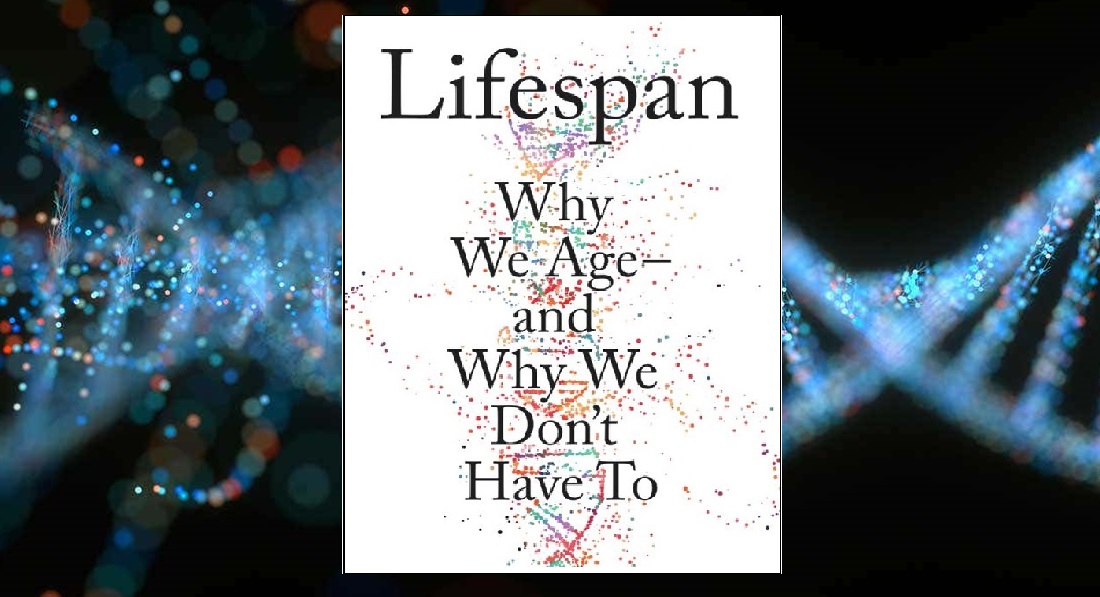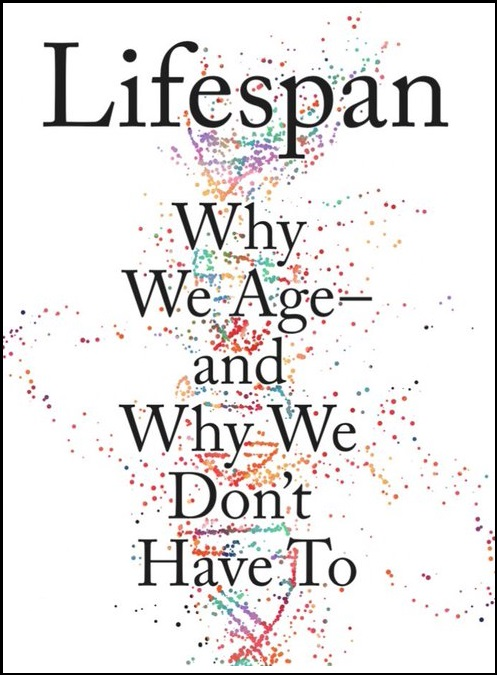
To give it its full title, Lifespan: Why We Age – and Why We Don’t Have To, contains all the latest research in the field of ageing. The author is a Professor of Genetics at Harvard who tries to summarise decades of research done by himself and others into longevity.
The book is split neatly into three parts, Past, Present and Future. The past takes us through the early research and theories on the mechanisms behind ageing and whether those have since been debunked. There’s also plenty of biological explanations that a brighter mind is bound to appreciate, and for those of us lost in the terminology he adds real-life metaphors such as scratches on a DVD.
We demonstrated that the redistribution of Sir2 to the nucleolus is a response to numerous DNA breakages, which happen as a result of ERCs multiplying and inserting back into the genome or joining together to form superlarge ERCs.
Lifespan, Chapter 2 The Demented Pianist, Page 42
The present is probably the part of the book most people are interested in when they read the title, A.K.A. tell us what we can do right now to slow ageing. I was familiar with many of the practices having listened to podcasts by Rhonda Patrick among others, techniques such as Intermittent Fasting or Time-Restricted Eating that have entire books dedicated to them, reduction in dairy and meat consumption, intense exercise and hot/cold therapy. Beyond that he touched on a few I wasn’t aware of, supplements such as NMN, Metformin and Resveratrol being the key prospects for life extension.
The future, well to be blunt, felt like the inane ramblings of a GCSE student who’s trying to blag their way through an essay question having done minimal preparation. It was very padded and repetitive, full of hope and optimism with nothing I considered noteworthy for several chapters. The three parts make up 310 pages and I would rather pay 3/4 the price and have him remove pages 211 through 283 (the very last section is a little more coherent and interesting).
I felt this worthy of a review but at the same time it is not going on my recommended list. If you want actionable insight then I would direct you to Rhonda Patrick’s website, where she goes in depth on Resveratrol, Sirtuins, Fasting, FOXO and the aforementioned Time-Restricted Eating.
Lifespan: Why We Age – and Why We Don’t Have To by David Sinclair

PRO TIP: Take notes! When you read a book, use a blank sheet of paper as a bookmark. Write down any interesting facts and information from the book. This condenses a whole book into 3-4 pages of key notes that are important and relevant to you.
My Notes
- While the average lifespan has increased, this is mainly due to a reduction in infant mortality, and the maximum age which we live has remained quite stable.
- Stopping all cardiovascular disease would only add 1.5 years to life expectancy on average. Curing cancer would add 2.1 years.
- Antioxidant rich diet is not as important as we think, according to research completed around 10 years ago. Benefits from an antioxidant-rich diet likely stem from increasing the body’s own natural defense against ageing.
The Hallmarks of Ageing
- Genomic instability caused by DNA damage
- Attrition of the protective chromosomal endcaps, telomeres
- Alterations to the epigenome that controls which genes are turned on and off
- Loss of healthy protein maintenance, proteostasis
- Deregulated nutrient sensing caused by metabolic changes
- Mitochondrial dysfunction
- Accumulation of senescent cells that inflame healthy cells
- Exhaustion of stem cells
- Altered intracellular communication and the production of inflammatory molecules
- We have “digital” DNA information (the nucleotides A, T, C, G) and “analog” information (epigenetics – whether a gene is switched on or off). It’s the analog information that is more susceptible to damage over time.
- The fact that cloning an older animal doesn’t make the new animal live a shorter life means our DNA is still “young” as we age
- More than a dozen genes have been discovered that extend and promote lifespan, known as longevity genes or sirtuins.
Sirtuins are enzymes that remove acetyl tags from histones and other proteins and, by doing so, change the packaging of the DNA, turning genes on and off when needed.
Lifespan, Chapter 1 Viva Primordium, Page 24
- Sirtuins have evolved to require a molecule called Nicotinamide Adenine Dinucleotide or NAD.
- The loss of NAD as we age and the resulting decline in sirtuin activity is thought to be a primary reason our bodies develop disease when old but not young
- Another longevity gene is Target of Rapamycin, mTOR.
- A third pathway is a metabolic control enzyme AMPK.
- Certain stressors activate longevity genes without damaging the cell, which is known as Hormesis. Examples: hot/cold therapy, Intermittent Fasting, low-protein diets.
Actionable Points
- If you do one thing for longevity, it’s eat less. Fasting.
- Part of the benefits of fasting are triggered by feeling hungry, so eating more satiating foods won’t work
- Hot dogs, sausage, ham and bacon are carcinogenic, 100+ studies show link between them and colorectal, pancreatic and prostate cancer.
- Red meat contains carnitine, gut bacteria convert to TMAO, suspected of causing heart disease.
- Limiting intake of meat and dairy is good for longevity
- Restriction of Methionine (an amino acid) does a good job of increasing longevity. Methionine can be found in beef, lamb, poultry, eggs and pork.
- The same is true with restriction of arginine and Branch Chain Amino Acids (BCAA’s).
- The longevity benefits of exercise require an intensity around 75-80% max HR or above.
- One study found daily sauna use vs once a week sauna use saw a twofold drop in heart disease and all cause mortality
- Metformin, through AMPK activation, makes more NAD and turns on sirtuins and other defenses against ageing
- Resveratrol extends lifespan, though there was not much of an effect for people already doing Time-Restricted Eating.
- Resveratrol is famously found in red wine, but the mice in the study had a resveratrol intake equivalent to a human consuming 750-1000 glasses of red wine per day.
- NMN found in avocado, broccoli and cabbage can increase NAD by 25% for the next few hours
- The Author takes 1000mg each of NMN, resveratrol (mixed in homemade yoghurt) and metformin every morning. Also Vitamin D, K and 83mg Aspirin. He makes it very clear this is a best guess and as he isn’t an MD he cannot recommend you do the same. Since everyone’s body is different it may have no benefits or even be harmful to blindly copy his routine.

